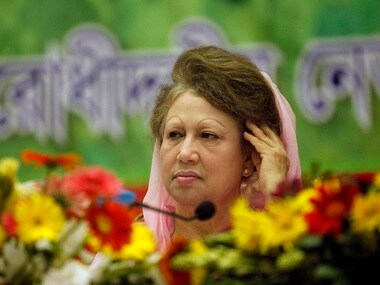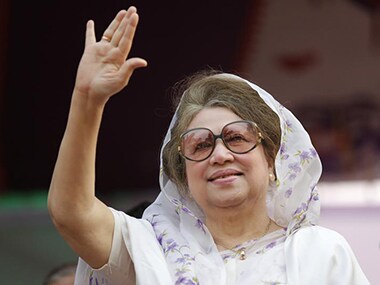A court in Bangladesh sentenced Opposition leader Khaleda Zia to five years in jail on Thursday after convicting the former prime minister of embezzling money meant for an orphanage.
Zia, the leader of the opposition Bangladesh Nationalist Party (BNP), was found guilty of stealing $252,000 from a trust created for an orphanage, a charge she had dismissed as "politically motivated". Her son, Tarique Rahman, and four others were also jailed for 10 years each at the end of a case that lasted nearly 10 years.

File image of Begum Khaleda Zia and Begum Sheikh Hasina. AFP
Khaleda and the BNP say the charges are part of a plot to keep her and her family out of politics.
Current Prime Minister Sheikh Hasina and Khaleda, both related to former national leaders, have dominated Bangladesh politics for more than two decades, and have nursed a long and bitter rivalry.
Significantly, Khaleda's imprisonment will, in all likeliness, not allow her to contest elections in Bangladesh slated for December and is likely to inflame their rift further.
Bitter rivals
Zia, 72, and Hasina, 70, are known as the 'Battling Begums' for their bitter rivalry that has poisoned Bangladeshi politics for nearly three decades.
Since 1991, when Khaleda first became prime minister, the office has largely swung back and forth between the two warring women. Both have also laid claim to aspects of Bangladesh's independence.
Hasina is the daugher of Mujibur Rahman, who led the country to independence from Pakistan in December 1971. He was assassinated in a military coup in 1975, along with most of his family. Khaleda, leader of the Opposition, is the wife of Zia-ur Rahman, an army officer who was the country's first military dictator. He was president from 1977 to 1981, before he, too, was assassinated.
According to a report in The Economist, both Mujibur and Rahman grew dictatorial in power and had resorted to violence to settle scores. This tendency is now seen in Hasina and Zia as well. "When Hasina came to power for the second time, in 2009, she took a more aggressive approach, going after her enemies and settling scores... Hasina has outsmarted Zia, who shows signs of frailty," the report said.
"When Sheikh Hasina refused to give way to a caretaker government before the general election of 2014, the BNP played into her hands by boycotting the poll and encouraging violence," the report added.
Terming Zia's conviction as natural consequences of her past deeds, Hasina accused her arch-rival of looting public property and burning to death over 500 people in a "demonstration of extreme brutality". "The reign of brutality unleashed by Khaleda even shook the throne of the almighty... so her conviction was very much natural," she added.
She said that in 2015, Khaleda declared she would not return home without toppling the Awami League government and to make this happen, she opted for brutal violence sitting in her office.
Hasina was referring to the protracted blockade enforced by the Bangladesh Nationalist Party (BNP) and its crucial ally Jamaat-e-Islami coinciding with the 2014 elections demanding polls under a neutral government. The BNP eventually boycotted the elections and became the Opposition having no representation in Parliament.
Hasina's Awami League came to power for a second consecutive term after a bloody parliamentary election that was boycotted by Khaleda’s party.
Such is their rivalry that in 2013, Khaleda chose to celebrate her birthday on 15 August, to mark the occasion on which Hasina lost almost her whole family in a bloody military coup.
According to ANI, a BBC report revealed that Khaleda deliberately chose to celebrate her birthday when the rest of Bangladesh observes the death anniversary of Hasina's father, the 'Father of the Nation' Mujibur Rehman.
Khaleda also accused Hasina of "selling out" Bangladesh to India in order to stay in power, during the latter's visit to India to meet Narendra Modi. "Hasina dreams of remaining in power for life. She has done many things for this. She kept nothing for the country, sold everything," Khaleda had said, according to PTI.
On the other hand, Hasina inaugurated a new cantonment at Patuakhali in the south-western coastal district which she named after herself, the 'Sheikh Hasina Cantonment'.
Political implications
The renewed tension between them raises the spectre of a long, destabilising spell of unrest for Bangladesh and its economy. Khaleda is due to run in parliamentary polls set for December and can still do so if an appeal is pending.
According to a report in The Indian Express, "The BNP had refused to contest the last general elections in 2013 as well, thereby allowing Hasina to rule the roost for the last five years. But this time, the BNP was all set to contest and believed it would reap the advantage of Hasina's falling popularity."
"In fact, it was also being whispered – loudly – in Dhaka that if elections were to be held in Bangladesh today, Hasina's Awami League would lose," the report added.
Khaleda has an upper hand because of the element of "faith" she has in the armed forces. According to DailyO, "The call for army deployment (ahead of the elections) is a clever political move by the BNP leader... it is an obvious political initiative to woo the army and at the same time a possible bid to wean them away from those at the helm of power."
Meanwhile, some reports suggest that the political rivalry could also be fuelling terror attacks in Bangladesh.
Zia's arrest, and subsequently BNP's continued absence from the political scene, will all but decimate the party's political influence across Bangladesh. Hasina, meanwhile, looks set to become stronger and even more powerful, much in the manner of her idol Indira Gandhi, The Indian Express report adds.
With inputs from agencies
Published Date: Feb 09, 2018 15:03 PM | Updated Date: Feb 09, 2018 15:03 PM




















